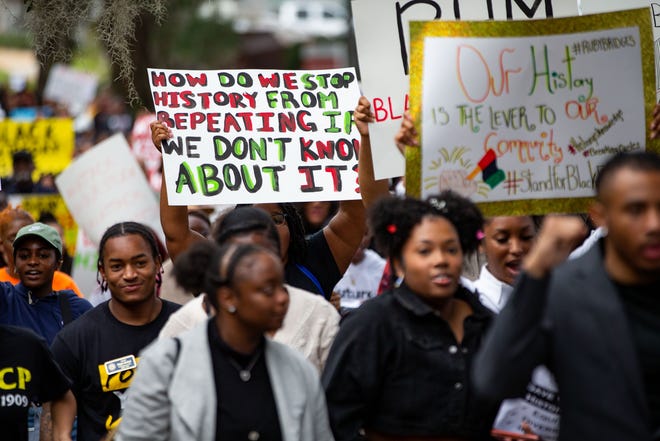
I relocated to Jacksonville approximately five years ago and my ultimate retirement plan always included living here. I typically don’t complain in public. If something disturbs me, I usually just shake my head and hope for the best. Well, today I am disturbed, and I can’t sit back shaking my head.
It infuriates me that Gov. Ron DeSantis, along with his handpicked education board, has made the decision that Black history should be altered when taught to middle schoolers. The governor apparently does not want them to “feel bad” about themselves when learning about the heinous acts and crimes enacted by many of our Caucasian ancestors on people of color, specifically African Americans. The book bans were bad enough; have we forgotten that those who do not learn from history are doomed to repeat it?
What is becoming of this state? We can no longer sit back and allow Gov. DeSantis to slowly turn back the hands of time. It seems to me that he is trying to grab the mechanics of government and become a dictator. He has gathered extraordinary power into his own hands and is passing laws to support some people — not all people.
We know this behavior is not new; what is new, however, is the willingness of so-called establishment Republicans to support this authoritarian grab.
He is turning us against each other, designing laws that take African Americans back hundreds of years. We cannot allow this to continue. God bless us all.
S.C. Carter, Jacksonville

History misused for politics
The misuse of history has a long political legacy. Gov. Ron DeSantis, adept at such misrepresentations, joins the likes of contemporary politicians like Vladimir Putin. When DeSantis claims that enslaved Africans developed skills such as blacksmithing under conditions of slavery, he embraces propaganda and falsehoods.
If the new curriculum for African American history aimed at middle school students in Florida makes such claims, then it is plainly wrong and dangerously misleading.
African ironworkers, including blacksmiths, have a deep history of innovation and accomplishment that they brought to the New World. For nearly two millennia, Africans developed advanced modes of iron production that rivaled Europe. Blacksmiths were highly skilled and valued members of African societies; when practicing their craft under conditions of slavery needed no skill development. They were already highly skilled and much sought after by plantation owners.
The histories of these accomplishments are prominent in the historical and archaeological literature, leading one to believe that the so-called scholarly advisers to this curriculum development were either unschooled or politically motivated. Such blatant and grossly embarrassing claims expose DeSantis and the Florida Department of Education as manipulative and ignorant of established facts — a powerful indictment indeed.
Peter R. Schmidt, Waldo, professor emeritus of anthropology at the University of Florida
Florida’s murky education objectives
At the beginning of the “anti-woke” war being waged across our state, one of the objections to teaching the true history of slavery was that it made white students feel bad.
The term “bad” is vague. Did they feel bad for the enslaved people? Or did it make them feel somehow responsible?
Feeling bad for the enslaved is called empathy, and it is a good thing, according to the Bible. Some people develop empathy as they grow out of childhood and become adults. It is part of the maturation process.
There is no reason for anyone alive today to feel responsible for slavery. Not one of us had anything to do with what happened 200 years ago. We simply cannot help what happened in the past.
What we can help is what happens right now, today — how we live our lives, how we treat others and the choices we make.
If the argument is to keep children from learning the truth about slavery so as to prevent them from becoming empathetic, then the effort is working against the best interest of the child. If it is to keep the child from feeling responsible, then it is misguided
Mike Lawrence, Avondale

Seeing slavery in positive light
One of the many items I look for during my daily reading of the Times-Union is the “Today in History” section. Among the July 22 highlights was “1862: President Abraham Lincoln presented to his Cabinet a preliminary draft of the Emancipation Proclamation.”
That is just one of the many reasons why I am a big fan of “Honest Abe.” I am also a big fan of Benjamin Franklin, and not just because he founded Dear Old Penn [University of Pennsylvania]. Ben Franklin is also on the lengthy list of American icons who clearly opposed slavery. Closer to home, I have photos of two of my ancestors who served as enlisted men during the Civil War. That could not have been pretty. But the outcome — preserving the nation and abolishing slavery — was.
But these days we almost never read or hear of anything positive when slavery is discussed. Any American worth their salt should already know what a despicable concept slavery is. But what about the actions taken by our country, as well as many of its high- and low-ranking heroes to successfully eliminate slavery?
Let’s try to focus a bit more on the positive.
Sam Heffner, Ponte Vedra Beach

Florida schools don’t need Harris
Vice President Kamala Harris came to Jacksonville on July 21 to voice her opinion about Florida’s school system.
Harris has shattered records. An NBC poll recently found that her net-negative rating is at -17, the lowest in history for a vice president. Also, things seem to have gotten worse since President Joe Biden placed Harris in charge of fixing the chaos at the Southern border in March 2021.
So why does anyone think that the Florida school system needs Harris? It appears to me that lots of Florida parents are pleased with the changes our governor has made.
We do need to have American history in our schools, to see how all of us together as Americans made this country what it is today — with all its warts and flaws. To just pull out African American, Jewish, Asian or white history only further divides us.
Sonja Harpe, Jacksonville

New history standards a new low
I want to thank the Florida Department of Education for teaching me something new: that slavery was about vocational training. Here I thought it was a brutal example of man’s inhumanity to man.
I think the next logical step is to rename the Trail of Tears to the Trail of Joy. I mean, Native Americans got to see a different part of the country, singing and dancing all the way west. While we are at it, let’s say that women and minorities only get the right to vote when they are deemed mentally and emotionally mature enough to handle the responsibility.
I already knew Florida is a place where truth goes to die, but this is a new low. I am both ashamed and disgusted.
Maryann Dyal, Atlantic Beach

Burton a good pick for public safety
Recently, Sheriff T.K. Waters held a town hall-type meeting to discuss Jacksonville’s crime problem. It was not much of a town hall — only an hour long and the question-and-answer session was very short.
As usual, he did not really discuss any plans to improve the police’s interaction with the city’s Black community. That is a shame because there are many things that he could have discussed.
For example, a new study in the Proceedings of the National Academy of Sciences recently determined that the chances of a search, handcuffing or arrest of a Black driver were nearly three times more likely to occur if the officer started the encounter with a command such as “Keep your hands on the wheel” or “Turn the car off.”
After examining police body-camera footage in 577 routine car stops involving Black drivers, the study determined that the first 45 words spoken by a police officer to a Black driver (less than 30 seconds on average) can make all the difference in the world.
Imagine the good that would come from teaching our officers not to use commands in the first 30 seconds of a routine traffic stop.
But Sheriff Waters has shown no interest in these types of solutions in the past.
Fortunately, Mayor Deegan has appointed former Jacksonville sheriff’s officer Lakesha Burton as the city’s new chief of public safety. This is exactly the type of change in training that would interest Burton. Thank goodness for that fact.
Terry D. Bork, Jacksonville

Student loan pause will still cost us
Student loan payments will resume in October. Both the Trump and Biden administrations gave borrowers the opportunity to pile on more debt with their pause in payments. The payment pause in March 2020 was understandable due to the impact of COVID. This was to last seven months, but the forbearance was repeatedly extended by both administrations for 40 million borrowers.
According to TransUnion, 53% of consumers with student loans increased bank credit card debt, 36% took out new auto loans and 15% added mortgages or unsecured personal loans. As long as borrowers didn’t have to repay student loans, they could afford to take on other debt. Student loan forbearance has cost taxpayers $200 billion. President Joe Biden’s original loan forgiveness effort would have been an additional $400 billion cost to taxpayers.
Now that student loan payments are set to resume, there will probably be defaults on other debts impacting the economy. This is a perfect example of the problems created when government makes it such that people don’t have to feel responsible for their financial decisions and obligations.
Doug Diamond, Jacksonville

‘Time blindness,’ huh?
As a long-time subscriber, I like to occasionally write letters to the Times-Union, sometimes in praise and sometimes because I’m appalled. More often nowadays, I’m appalled, and reading a USA Today reporter’s July 24 piece on tardiness reminded me why.
Apparently, “time blindness” is now a psychological disorder that explains why some people just can’t be on time. A teary woman went viral on TikTok for being refused when she asked her employer for a special accommodation for her “time blindness.” According to the story, that’s why she is always late to work.
It’s like a parody, but unintentional — the absurdity lost on the reporter and the poor woman gone viral on TikTok. This was made even worse by the psychologists interviewed for the article. “It’s a real thing that’s been researched,” said one.
Will laziness be next? I had “work blindness” as a kid and would’ve loved to use that excuse to my dad.
Mike Disch, Neptune Beach

Erasure of which rights?
A July 16 guest column by Amy Glassman challenged readers to consider the cost “when your own rights are on the chopping block one day.”
Her column described difficulties she experienced during her college years. She was looking for community support, grappling with her identity and searching for a new religion as she struggled with estrangement from her family.
These situations, it seems to me, are pretty common among young people. Glassman reported how she was helped at that time by people she met at UNF and clubs there, particularly her participation in ROTC, the Interfaith Center and the LGBTQ Center.
Because of recent laws passed this past year, she fears her “rights” to these opportunities are being erased. Students (like all of us) are still currently able to gather together, choose a religion and seek out counseling in the search for identity.
So, which rights are being erased?
Ann Barrett, Jacksonville
Charging stations need private funds
I noticed in a July 17 article that President Joe Biden is dedicating $20 billion toward building electric charging stations. I wholeheartedly agree that we need plentiful charging stations to service the ever-increasing number of electric vehicles. However, they should not be built by the federal government, but by private enterprise.
This is another way of increasing personal taxes, all in the name of big government. Where are the John D. Rockefellers, the wealthy business leaders of today? Inflation Reduction Act, indeed.
Jeffery Allen, Mandarin




